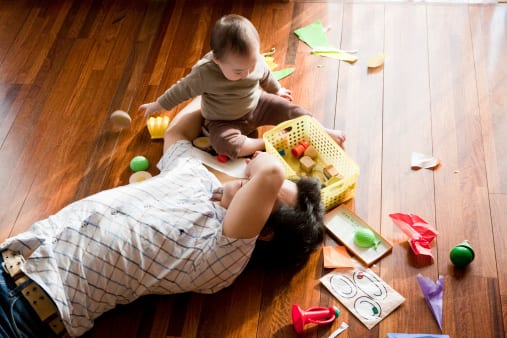Whether you’re new to fatherhood, or your family has grown by leaps and bounds, being a new dad can be tough on even the strongest person. This is why it’s important to understand that just as new mothers can suffer from postpartum depression (PPD), so can new fathers.
Some 10% of men worldwide suffer from Paternal Postpartum Depression, or PPPD, according to JAMA, the journal of the American Medical Association, and experts believe that PPPD could affect as many as 1 in 4 (25%) of dads. While we certainly do not want to take away from the serious issue of postpartum depression in moms, dads deserve our attention, too, in their transition to fatherhood.
Dads Can Be Sad, Too
How many times have you heard the phrase, “Man up?” Probably more times than you can count. And that is what makes paternal postpartum depression so difficult. Men are supposed to be “tough,” and not be sad or depressed. Sometimes men even feel ashamed to be sad or depressed, and they don’t want to talk about their feelings. Being aware that dads can be sad or “blue” after the birth of a new baby is so important. Awareness is key! Yes, new dads can be sad, too.
Common signs of postpartum depression in all parents include:
- Feeling overwhelmed, exhausted and insecure
- Crying spells, sadness, hopelessness
- Anger, irritability, frustration
- Repetitive fears and worries
Parenting as a Team Sport
Talking about feeling depressed or sad is not something most dads want to discuss with their partner, particularly if mom is feeling blue herself. But it’s also just as important for new moms to know how dad is feeling. Parenting is a team sport!
Dads: Find other men who you can talk to and be supported by during this incredible change in your life. Remember the Johnson & Johnson commercial, “A Baby Changes Everything?” They’re right! A baby does change everything, but with the right support system, being a new father can be a wonderful experience. Finding that right support system is important. And support systems take many forms…family, friends, nurses, “dads” meet-up groups, health department staff, work colleagues, whatever your support system may be, take advantage of it!
Take Care of Yourself
Just as mom is going to need some time to herself, so is dad. And being at work doesn’t count as “me time!” Remember that support system? Now is the time to rely on trusted family and friends to watch baby while you and mom can have time apart, or even better, have some couple time! What reduces your stress? Be thinking about those things that can help you relax and make it easier for you to care for your family. Taking care of yourself is going to be the most important gift you can give your new baby and your partner.
Conversely, spending time caring for and nurturing your baby will build your confidence as a dad, boosting those good feelings to help offset those doubts and insecurities every parent feels with a new child.
Just for Moms
Mom, right after baby’s birth, you’ll be exhausted, and you may feel a little blue emotionally—a new baby can be very exciting and at the same time be hard work. Your partner wants to be able to support you and your needs with your new baby. Just as you need that support, so does your baby’s dad. Just as you listen and watch for subtle clues and changes with your new baby, do the same for your partner, as they no doubt are listening and watching out over you. Is he withdrawing from you and the baby? Suddenly difficult to talk to? Not eating? Even though sleeping might be tough for both of you now, significant changes in sleep are important to notice.
Warning Signs of Paternal Postpartum Depression
- Losing sleep; struggling to get good sleep
- Feeling left out of mom and baby’s connection, activities
- Feeling stressed about becoming a dad
- Difficulties in your relationship with baby’s mom
- Withdrawing from mom and/or baby
- Lack of a support group, including family and friends
- Limited resources such as financial problems
- Losing or gaining weight
- Using drugs or alcohol to cope
- History of depression
Source: Postpartum Support International






Comments are closed.